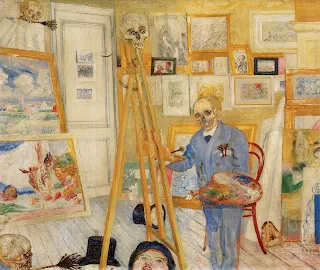In the world of epiphenomena, the haunt is king.
This sentence, believe it or not, forced itself upon me at 6:45 a.m this morning, as I was arising from bed to go empty my bladder. An old man in a dull month, or a dull man with an old prostate – one of those moments.
Well, yesterday I had to finish up some editing work, and in the evening we were scheduled to go to La Rotunde and chow down, but in between times I was thinking about haunting. In particular, haunted houses. Houses in which what happened in the house forms the nucleus of the story.
Haunted houses have been mocked in the cultures that claim to be children of the Roman Empire since Lucian of Samosata was a pup. In fact, Lucian’s dialogue, Philopseudès, or The lover of lies, is one of the great documents of the Hellenic enlightenment, written maybe a decade before Tertullian, in another part of the Empire, began vigorously damning peeps like Lucian. Renan compared Lucian to Voltaire – and Voltaire also compared Lucian to Voltaire. The lover of lies is a dialogue that contains a dialogue, a conversation between philosophers, so called, at gathered around the sick bed of an evidently wealthy man named Eucratès. They commence to talking about miracle cures, phantoms, and other such business, to the disgust of Tykhiadès, who takes the view, sometimes taken by Voltaire and lesser philosophes as well, that superstition is just stupidity. How can anybody be so dumb as to believe in ghosts haunting houses?
This kind of one dimensional positivism is still around. And it has its fragment of veracity: if we believe in something we call “cause”, much of these superstition visions seem to call for explanations rooted in local causes – like fear of the dark – rather than in cosmological causes – like an afterlife from which these phantoms come.
Our anthropological liberalism, too, searches for causes, but not in the stupidity of the credulous, but in cultural practices that we study while withholding our own cultural biases – an epoche that is either tolerant or patronizing.
Haunting, of course, as hauntology and all the rest of it, became a modish object of reflection after the fall of the wall. Helped along by Derrida’s Spectres of Marx, the idea of something haunting something else - the way Communism haunted Europe, or the way Hamlet’s dad haunted Hamlet – became a model for thinking about our own neo-liberal ghostliness.
Myself, as a citizen of Paris, think about haunting as a matter of urban history. And certainly Paris is a haunted and hunted city – we walk past old torture chambers and the ghosts of faits divers, here, as we go to Carrefour and get the meat and veggies and wine.
Paris has always been a central place for occultists, sex magic theorists, Gurdjeffians, far right white magic dudes, clairvoyants, and situationists. Yet, in the Paris media, the ghosts and haunted houses are usually somewhere else. There’s a whole mythology of Britain as a ghost-haunted place, and Brittany too. Whereas if such beliefs creep into Saint-Germain, they are intellectualized – its all surrealists and serious searchers in the Kabbalah.
In Southern France, “folk beliefs” are everywhere. Recently there’s been an excellent scandal in a village near Montpellier. The mayor of Agde, Gille D’ettore, felt that he needed a connection on high. He needed God. Or some spirit. So he searched around to contact the big OTHER, and had the misfortune to contact a corrupt clairevoyant, Sophia Martinez. Here’s the story in brief from the Midi Libre:
“Medium and healer, she is alleged to have used a stratagem with the Mayor of Agde and numerous other interlocutors: in using a masculine and raw voice on the telephone, she made them think she was in contact with a supernatural being from the Beyond. This voice incited them to take good care of the voyante, including materially.
Suddenly, she was able to pay, by means of Gilles D’ettore, for a veranda, a jacuzzi, a sumptuous wedding, airplane tickets for herself and her friends, etc.”
Such little things the beyond wants from us! D’ettore was not the only seeker after advise – some real estate broker is suing Martinez because he gave her ten thousand euros to speak to his late mother, which he did on the telephone – although the voice at the other end might, just might have been Martinez’s own.
If corruption there must be, I’m rather happy that it went into making sure a clairevoyante from Agde could soak in a jacuzzi after expending enormous spiritual energy connecting with the beyond. I get it.



No comments:
Post a Comment